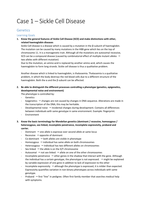Samenvatting
Samenvatting Cell Physiology and Genetics 2016 BIC20306
- Instelling
- Wageningen University (WUR)
Samenvatting van het gele vak Cell Physiology and Genetics. Alle eindtermen zijn overzichtelijk uitgewerkt. Informatie komt zowel uit het boek als uit de colleges/powerpoints. Meerdere mensen hebben het puur op deze samenvatting gehaald dus het is zeker een aanrader :)
[Meer zien]





